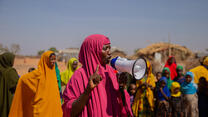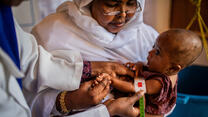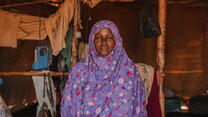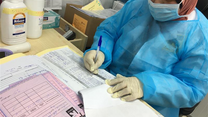The COVID-19 pandemic has overwhelmed health, educational, and economic systems around the world. The pandemic is driving a ‘double emergency’ in which vulnerable populations are experiencing not only the direct health impacts of the virus, but also its devastation to fragile humanitarian, economic, security, and political environments. The economic downturn associated with COVID-19 lockdowns will drive the number of hungry and malnourished people up by 35 million in 2021. Additionally, in crisis-affected contexts, state structures are often unable or unwilling to provide essential services to and meet the needs of displaced populations. This extends to vaccine access: 61% of national vaccination plans do not include refugees. Populations in these settings therefore rely on frontline NGOs to fill critical gaps; in some crisis contexts NGOs provide up to 80% of health services. Although frontline humanitarian NGOs are best placed to quickly scale up efforts in times of crisis, only 20% of the COVID-19 humanitarian appeal went directly to international, local and community-based NGOs. With COVID-19 cases rising in several fragile and displacement contexts, it is imperative that investments for the pandemic response meet needs and stem further spread of the virus.
The Biden-Harris Administration has taken important and crucial steps to provide relief to the most vulnerable populations abroad, such as through the American Rescue Plan’s supplemental funding for the international response; contributions to Gavi, the Vaccine Alliance; and commitments to provide 500 million vaccine doses and donate another 80 million excess doses to low- and middle-income countries. But vaccine donations alone are insufficient; they must be complemented by clear plans for and investments in the efficient and rapid delivery of doses, with careful attention to areas not reached by national governments.
To address both the direct and indirect impacts of the COVID-19 pandemic on fragile, conflict and displacement settings, the IRC recommends the Biden-Harris Administration take three actions:
1) Provide more funding quickly and directly to front-line responders, including international, national, and community-based NGOs to provide social services and support with vaccine delivery. Direct American Rescue Plan funds for ‘urgent needs’ to crisis and displacement contexts.
2) Work with multilateral partners and support host governments to include displaced and crisis-affected populations in national COVID-19 responses, including vaccine access and administration.
3) Fund the scale-up of innovative, evidence-based approaches in education, nutrition, cash, and gender equality that can achieve greater reach and impact in fragile and refugee contexts.



